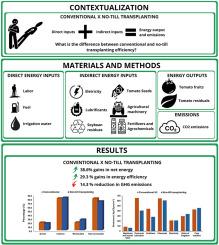巴西番茄工业生产中不同土壤管理做法的温室气体排放和能源消耗
IF 5.3
2区 环境科学与生态学
Q2 ENVIRONMENTAL SCIENCES
引用次数: 0
摘要
随着对更可持续的农业系统和减少环境影响的需求日益增长,保护土壤系统使产量增加,减少排放和投入物的使用。目前,巴西已加紧向直接移植系统过渡,特别是在番茄工业生产地区。在此背景下,本研究旨在确定南方Goiás不同土壤管理制度下工业番茄生产的能源消耗和温室气体(GHG)排放。通过对与传统土壤管理和免耕移植系统相关的能量消耗进行实地调查,确定了能量流、生产和温室气体排放。结果表明,番茄生产系统严重依赖于不可再生能源,与肥料、化学品和燃料相关的能源消耗显著。该系统的能量转换能力被证明是足够的,表明采用免耕移植系统与传统系统相比,净能量增加38.6%,能源效率提高29.3%,温室气体排放减少14.3%。这些结果强调了在工业化番茄生产中采用保守系统的可行性。本文章由计算机程序翻译,如有差异,请以英文原文为准。

Greenhouse gas emissions and energy consumption from different soil management practices in industrial tomato production in Brazil
With the growing demand for more sustainable agricultural systems and reduced environmental impacts, conservationist soil systems have enabled production gains and reductions in emissions and input usage. Currently, the transition to direct transplantation systems has intensified in Brazil, particularly in industrial tomato production areas. In this context, this study aimed to determine the energy consumption and greenhouse gas (GHG) emissions of industrial tomato production under different soil management systems in southern Goiás. Energy flows, production, and GHG emissions were determined through field surveys of energy expenditure associated with conventional soil management and non-till transplanting systems. The results revealed that tomato production systems heavily depend on non-renewable energy sources, with significant energy consumption related to fertilizers, chemicals, and fuels. The systems' energy conversion capacity proved adequate, showing that adopting no-till transplanting systems results in gains of 38.6 % in net energy, 29.3 % in energy efficiency, and a 14.3 % reduction in GHG emissions compared to the conventional system. These results highlight the feasibility of adopting conservative systems for industrial tomato production.
求助全文
通过发布文献求助,成功后即可免费获取论文全文。
去求助
来源期刊

Environmental Development
Social Sciences-Geography, Planning and Development
CiteScore
8.40
自引率
1.90%
发文量
62
审稿时长
74 days
期刊介绍:
Environmental Development provides a future oriented, pro-active, authoritative source of information and learning for researchers, postgraduate students, policymakers, and managers, and bridges the gap between fundamental research and the application in management and policy practices. It stimulates the exchange and coupling of traditional scientific knowledge on the environment, with the experiential knowledge among decision makers and other stakeholders and also connects natural sciences and social and behavioral sciences. Environmental Development includes and promotes scientific work from the non-western world, and also strengthens the collaboration between the developed and developing world. Further it links environmental research to broader issues of economic and social-cultural developments, and is intended to shorten the delays between research and publication, while ensuring thorough peer review. Environmental Development also creates a forum for transnational communication, discussion and global action.
Environmental Development is open to a broad range of disciplines and authors. The journal welcomes, in particular, contributions from a younger generation of researchers, and papers expanding the frontiers of environmental sciences, pointing at new directions and innovative answers.
All submissions to Environmental Development are reviewed using the general criteria of quality, originality, precision, importance of topic and insights, clarity of exposition, which are in keeping with the journal''s aims and scope.
 求助内容:
求助内容: 应助结果提醒方式:
应助结果提醒方式:


